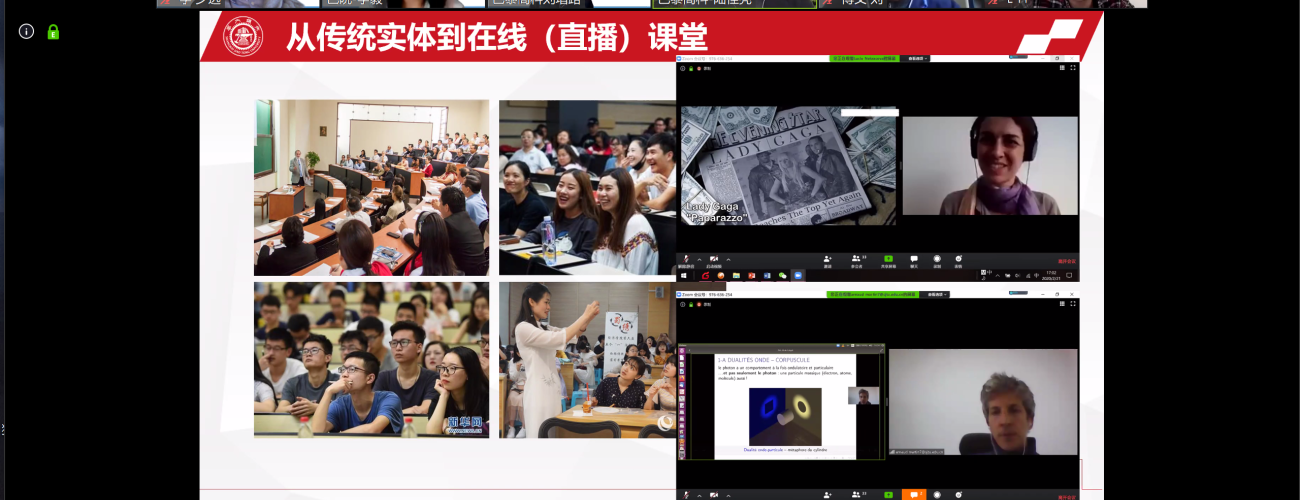
teaching online - SPEIT
SPEIT
Newsletter 7 China: a light at the end of the tunnel?
ParisTech is part of three Franco-Chinese institutes: Chimie Pékin (Beijing), SPEIT (Shanghai) and ICARE (Wuhan).
We asked Anouk Galtayries and Van-Bao Ta (co-directors of Chimie Pékin), Frédéric Toumazet (Dean of SPEIT), Michel Farine (European Dean of ICARE) and Laura Villette (ParisTech director in China) about their experience of the Covid-19 crisis.
What has it been like in China during the crisis? What support did you receive?
F.T.: In China, or in Shanghai to be precise, everyone seemed to be in a kind of stupor at first. The city was already empty because people had left for the Chinese New Year holiday, and the situation seemed surreal. After the first few days, the restrictions began: masks, sometimes gloves too, and stringent health checks.
L.V.: Somewhat paradoxically, the crisis has brought us closer to our Chinese partners. In February the ParisTech China Office sent messages of support to the directors of international relations at our partner universities. Christian Lerminiaux, President of ParisTech, followed up on this by writing letters of support to the presidents of those universities. And then when the crisis reached France, the roles were reversed and our Chinese partners reached out to us with words of encouragement and support.
How have things changed for your students?
M.F.: ICARE, which is part of HUST, is located in Wuhan, which was of course the original epicentre of the coronavirus outbreak. Classes did not start up again after spring break and HUST is still closed to students. Teaching staff have just recently started returning to their labs, but are subject to strict health checks. We’ve felt fully supported by the Chinese-European team, who were all 100% committed to putting students’ needs first as we worked out how to best manage the crisis.
A.G./VB.T.: At Chimie Pékin, the management team decided to move teaching online. One challenge we’ve faced was the time difference, because some of our academic staff are still stuck in France. Using large-scale video conferencing tools and cloud storage solutions we’ve been able to set up two types of online classes: pre-recorded video sessions, and live broadcasts.
M.F.: From the middle of April, our European lecturers started putting up their classes online, usually as PowerPoint presentations with accompanying notes and audio comments, and we plan to continue working like this until August. Our students can therefore work independently from wherever they currently are (many international students have returned home, and our Chinese students are dispersed throughout the country) and then participate in live Q&A sessions with lecturers. Classroom-based exams will be held from September onwards so that students can complete the requirements for their French Master’s qualification.
F.T.: The biggest challenge was how to support our exchange students. In an already a complicated situation, we had to assist French students here who wanted to go home, and then when the crisis reached France, we had to turn our attention to students there who wanted to come back to China. With the crisis unfolding on a different timescale in the two countries, the health guidelines and restrictions were not always the same, and this led to considerable confusion and worry.
Would you say the crisis is over?
A.G./VB.T.: Sadly no, it’s a long way from being over. Yes, the situation has improved, but we’re not back to normal yet.
What arrangements have you made for the new term?
A.G./VB.T.: We already know that this new term is going to be like no other. There will still be restrictions in place, and lots of questions remain to be answered, in particular when and how students will return, what to do about recruiting new students, when travel restrictions will be lifted, etc.
M.F.: If our European staff cannot return to China in September, we will continue to run classes remotely. Chinese lecturers should be able to resume teaching as usual, but we don’t yet have any official information from HUST.
F.T.: We’ve learned a great deal about how to teach online. We’re going to need to continue to build on this and apply everything we’ve discovered during this period to our regular teaching activities.
You can access these interviews in full and read about the experiences of French staff in China here:
Work in times of pandemic: Laura Villette, ParisTech director in China
Sino-French Institutes in times of pandemic: Chimie Pékin
Interview: A Sino-European Institute in times of pandemic. Michel Farine, ICARE European dean

